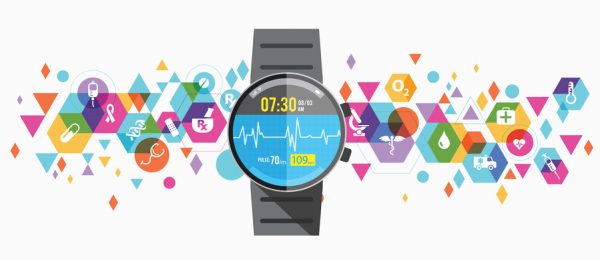
Today’s healthcare ecosystem is complex, with the patient at the center of it all. There has never been a time where so much innovation is happening in healthcare than today, all with the aim of providing better patient care and better patient outcomes. Wearable technologies are playing a significant role in that innovation. While wearable technology is not new, it is seeing explosive growth. As wearable tech gains traction, it is important to understand how it can and will affect both healthcare delivery and patient experiences.
Wearable technology can be broken down into two categories:
- consumer wearables like watches, rings, and clothing, and
- medical grade wearables (such as blood pressure, glucose, and heart monitors) that can be used in the hospital as well as post-discharge.
Consumer wearable technologies empower patients to take an active role in their health. Healthcare professionals often face challenges in managing their patients’ lifestyles, including their activity levels, fitness, nutrition, sleep patterns, and mental health. Wearable tech addresses these areas by enabling patients to track and monitor themselves. This potential for self-management can reduce the burden on the healthcare system, resulting in fewer doctor visits, lower hospitalization risks, and fewer diagnostic tests as patients can take corrective action earlier or identify issues sooner.
Many patients appreciate the innovation and utility of consumer wearable devices in managing and monitoring health conditions and promoting wellness. One patient noted on social media, “Wearable tech is going to explode, and I think particularly in health-related stuff. I’m seeing much more people wear this thing implanted in your arm and you just put your phone up to it to check your blood sugar. I’m sure there will be many more applications for this soon.”
For consumer wearable technologies to be effective and considered a valuable option, accuracy is crucial. Healthcare professionals are becoming more comfortable with patients wearing these types of technologies so long as the data they produce are accurate. The last thing healthcare professionals want is an influx of calls, inquiries, and concerns from patients saying that what they see from their wearable devices turns out to be false; they are busy enough as it is. If consumer wearables can be shown to produce accurate data, healthcare professionals can recommend these technologies to their patients. These devices provide tracking data, which, because the data are timely and longitudinal, is superior to just addressing issues at an annual check-up or brief, regular office visits.
Patients also express a desire for accuracy. They are aware that while wearable tech provides valuable insights, it should not be solely relied upon. Another patient on social media mentioned, that one device, when used for health tracking, “is a good tool that can help populations of people with risk factors for a-fib keep track of their heart rhythm during the day. It’s not 100% accurate and shouldn’t be solely relied on, but it is still useful. That is in conjunction with scheduled GP and cardiologist visits, not in place of.”
Ultimately, while these consumer-friendly devices can empower patients, they are no substitute for medical professionals, who know how to properly interpret the data and understand how and what action to take as a result. In that sense there is still going to be a need for human expertise. There is also going to be a need for data management given the amount of data these devices produce and the need to integrate this information with other medical data to provide a more wholistic view of the patient’s health.
Medical-grade wearables are becoming more prevalent as healthcare providers work to provide more non-invasive options and enable remote monitoring of patients in the hospital and once they are discharged from a hospital to ensure they are recovering properly. Medical-grade wearables must adhere to stricter standards, so they may not be as user friendly as a consumer wearable such as a watch or a ring, but their value in improving patient care is accelerating their adoption. They empower patients with the knowledge that their providers have current information on them and provide more timely data for physician intervention.
Looking ahead, the integration of wearable tech into broader health systems and ensuring data accuracy will be crucial. With the increasing volume of data from wearables, effective management and analysis are essential. Ultimately, while wearable technology offers transformative potential for both patient care and personal health management, balancing technological innovation with human expertise will be key to maximizing its benefits and enhancing overall health outcomes.
Photo: exdez, Getty Images
David Ouellette brings over 18 years of market research experience to his role as Director at KS&R, specializing in client relationship management with a focus on healthcare and medical devices. He excels in consulting with clients to address their key business questions, whether domestic or global, large or small.
Sabrina Moreno serves as a Market Research Apprentice at KS&R, playing a crucial role in supporting industry teams on diverse projects. Sabrina collaborates on the firm’s key marketing initiatives, contributing her expertise and dedication to enhancing the company's strategic direction.
This post appears through the MedCity Influencers program. Anyone can publish their perspective on business and innovation in healthcare on MedCity News through MedCity Influencers. Click here to find out how.











